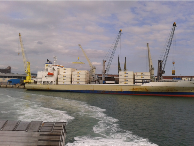 I’ve just come back from the local parcel office with a parcel. Yesterday I had one of those cards through the letterbox that tell you that they had tried to deliver a parcel, and I could collect it from the office.
The thing is, I know that they didn’t try to deliver the parcel. I was in, and the card just came through the letterbox with the other mail. I was next to the front door at the time - no ring, no knock.
Of course I understand that a large proportion of people they have parcels for are out when they call. I can see that they are just trying to make the jobs of the delivery people more efficient. It saves them the effort of carrying all that extra weight and bringing most of it back again. It saves them waiting to see if someone answers. And it saves them having to write out cards on the doorstep, possibly with rain smudging the ink and making the card go soggy.
The thing is though, I have paid to have that parcel delivered. I knew that I was most probably going to be in when the mail came round, so I was happy to take the small risk that I wouldn’t be and that I would have to collect it. I paid them to take the risk that I wouldn’t be in, with its efficiency implications. By writing out the cards without the parcel even leaving the office, they avoided the risk I have paid them to take, and transferred the inefficiency to me. Sadly, it is not just one organisation doing this – I have had similar experiences with other delivery services.
I’ve just come back from the local parcel office with a parcel. Yesterday I had one of those cards through the letterbox that tell you that they had tried to deliver a parcel, and I could collect it from the office.
The thing is, I know that they didn’t try to deliver the parcel. I was in, and the card just came through the letterbox with the other mail. I was next to the front door at the time - no ring, no knock.
Of course I understand that a large proportion of people they have parcels for are out when they call. I can see that they are just trying to make the jobs of the delivery people more efficient. It saves them the effort of carrying all that extra weight and bringing most of it back again. It saves them waiting to see if someone answers. And it saves them having to write out cards on the doorstep, possibly with rain smudging the ink and making the card go soggy.
The thing is though, I have paid to have that parcel delivered. I knew that I was most probably going to be in when the mail came round, so I was happy to take the small risk that I wouldn’t be and that I would have to collect it. I paid them to take the risk that I wouldn’t be in, with its efficiency implications. By writing out the cards without the parcel even leaving the office, they avoided the risk I have paid them to take, and transferred the inefficiency to me. Sadly, it is not just one organisation doing this – I have had similar experiences with other delivery services.
Keep your promises
A more honest approach would be to offer two categories of delivery at two different prices: a cheaper service, where you know you will have to collect, and a more expensive one where the attempt to deliver will be made. That way you could price the risk realistically. But providing the cheaper service when the customer has paid for the more expensive one is just wrong. In most industries, you would not get away with it. I have no doubt that they are all under a lot of competitive pressure. Probably local managers have concluded that it is necessary to do this to meet the tough performance targets which result. If so, that betrays both a cavalier approach, and a lack of joined-up thinking. If you don’t give your customers what they pay for, sooner or later they stop being customers.
Spotted from the Portsmouth to Cherbourg ferry – a container ship clearly branded ‘Fyffes’. To anyone in the UK (I’m not sure about elsewhere), that means only one thing: bananas.
How many bananas would you get on a banana boat? The banana boxes you see in supermarkets must be about 50cm x 35cm x 20cm (1/30 cubic metre) and I’d guess that they might hold about 100 bananas – so that’s something like 3000 bananas per cubic metre.
A standard container is about 2.4m x 2.4m x 12m, or 72 cubic metres – so that makes about 200,000 bananas per container. Its hard to tell how many containers there are on the boat, but perhaps 100? So maybe 20,000,000 bananas per ship – one between three for the entire population of the UK. That means we need a ship-load of bananas to arrive in Britain every day to provide the average 2 bananas a week that we each eat.
There are several interesting thoughts that follow from that. The first is simply the incredible logistical feat of providing that many ripe bananas, day in, day out, to shops across the land. Demand takes little account of seasons or weather, and bananas are quite easily damaged. Developing processes which can deliver that volume, in good condition and at the price people expect to pay, while having the resilience to cope with the vagaries of nature, is an impressive achievement. There is little to distinguish between one banana and another though – so its only getting those processes optimised that enables you to compete.
Another is the power of such rough and ready estimates. Starting from easy observations and guesses that anyone could make, we can get a pretty good estimate of shipping requirements: we might be 2x too big or small, but probably not much worse than that. Frequently there is no need for high precision, at least to start with, but the courage to estimate is not always easily found.
A final thought is the power of those little labels, When I was a child, it seemed as though every bunch of bananas had a Fyffes label on it. Fifty years later, the association is still instant. I’m not sure how that creates value for Fyffes (does it?), but the effect is unmistakable!
[caption id="" align="alignright" width="300"] Queueing for the Proms 2008 on the south steps of the Royal Albert Hall (Photo credit: Wikipedia)[/caption]
I’m sitting on the steps outside the Royal Albert Hall in London. Fortunately today it isn’t raining, but even if it was, I needn’t worry. These days the Proms have an excellent system for managing the queue – rather like the ones on the deli counters in supermarkets. When you arrive, you are given a numbered ticket, which guarantees your place in the queue. Once you have your ticket, you can wander off for a coffee or a snack, or take shelter if it rains, knowing that everyone will be admitted in the order they joined the queue regardless. It is not particularly sophisticated – but it is a simple system, and it works.
Simplicity is hard-fought-for: it does not happen by accident. Once a complex process or system is in place, changing it to remove unnecessary complexity is hard, just as all change is. Even stopping a simple system getting more complicated needs constant vigilance: otherwise, it is likely to gather exceptions and special cases, as well as extra checks that seem important, but which have a cost which is frequently overlooked. Just as nature dictates that the disorder of the Universe (or a teenager’s bedroom) increases with time, and that this can only be reversed by the input of work, so it is with organisations.
Why does it matter? Because a simple system is inherently more efficient and less error-prone. Have you tried to explain your organisation’s processes to a new joiner? If so, how easy do you find it to explain the judgements required if the process has branches (if this, then that, but if not, then the other), and how quickly do people learn to make them properly? Good governance depends on people following the rules. Complexity makes it more likely that people will make mistakes, and also makes it harder to spot when people deliberately try to get round rules. For an extreme example of what happens with complexity, think about tax codes: with complex rules and many special cases, expert advisers earn a good living, which must be at the expense of either the tax-payer or the tax-collector or both. While that is good for the experts, does that not make its complexity bad for the rest of us?
Queueing for the Proms 2008 on the south steps of the Royal Albert Hall (Photo credit: Wikipedia)[/caption]
I’m sitting on the steps outside the Royal Albert Hall in London. Fortunately today it isn’t raining, but even if it was, I needn’t worry. These days the Proms have an excellent system for managing the queue – rather like the ones on the deli counters in supermarkets. When you arrive, you are given a numbered ticket, which guarantees your place in the queue. Once you have your ticket, you can wander off for a coffee or a snack, or take shelter if it rains, knowing that everyone will be admitted in the order they joined the queue regardless. It is not particularly sophisticated – but it is a simple system, and it works.
Simplicity is hard-fought-for: it does not happen by accident. Once a complex process or system is in place, changing it to remove unnecessary complexity is hard, just as all change is. Even stopping a simple system getting more complicated needs constant vigilance: otherwise, it is likely to gather exceptions and special cases, as well as extra checks that seem important, but which have a cost which is frequently overlooked. Just as nature dictates that the disorder of the Universe (or a teenager’s bedroom) increases with time, and that this can only be reversed by the input of work, so it is with organisations.
Why does it matter? Because a simple system is inherently more efficient and less error-prone. Have you tried to explain your organisation’s processes to a new joiner? If so, how easy do you find it to explain the judgements required if the process has branches (if this, then that, but if not, then the other), and how quickly do people learn to make them properly? Good governance depends on people following the rules. Complexity makes it more likely that people will make mistakes, and also makes it harder to spot when people deliberately try to get round rules. For an extreme example of what happens with complexity, think about tax codes: with complex rules and many special cases, expert advisers earn a good living, which must be at the expense of either the tax-payer or the tax-collector or both. While that is good for the experts, does that not make its complexity bad for the rest of us?
 Queueing for the Proms 2008 on the south steps of the Royal Albert Hall (Photo credit: Wikipedia)[/caption]
I’m sitting on the steps outside the Royal Albert Hall in London. Fortunately today it isn’t raining, but even if it was, I needn’t worry. These days the Proms have an excellent system for managing the queue – rather like the ones on the deli counters in supermarkets. When you arrive, you are given a numbered ticket, which guarantees your place in the queue. Once you have your ticket, you can wander off for a coffee or a snack, or take shelter if it rains, knowing that everyone will be admitted in the order they joined the queue regardless. It is not particularly sophisticated – but it is a simple system, and it works.
Simplicity is hard-fought-for: it does not happen by accident. Once a complex process or system is in place, changing it to remove unnecessary complexity is hard, just as all change is. Even stopping a simple system getting more complicated needs constant vigilance: otherwise, it is likely to gather exceptions and special cases, as well as extra checks that seem important, but which have a cost which is frequently overlooked. Just as nature dictates that the disorder of the Universe (or a teenager’s bedroom) increases with time, and that this can only be reversed by the input of work, so it is with organisations.
Why does it matter? Because a simple system is inherently more efficient and less error-prone. Have you tried to explain your organisation’s processes to a new joiner? If so, how easy do you find it to explain the judgements required if the process has branches (if this, then that, but if not, then the other), and how quickly do people learn to make them properly? Good governance depends on people following the rules. Complexity makes it more likely that people will make mistakes, and also makes it harder to spot when people deliberately try to get round rules. For an extreme example of what happens with complexity, think about tax codes: with complex rules and many special cases, expert advisers earn a good living, which must be at the expense of either the tax-payer or the tax-collector or both. While that is good for the experts, does that not make its complexity bad for the rest of us?
Queueing for the Proms 2008 on the south steps of the Royal Albert Hall (Photo credit: Wikipedia)[/caption]
I’m sitting on the steps outside the Royal Albert Hall in London. Fortunately today it isn’t raining, but even if it was, I needn’t worry. These days the Proms have an excellent system for managing the queue – rather like the ones on the deli counters in supermarkets. When you arrive, you are given a numbered ticket, which guarantees your place in the queue. Once you have your ticket, you can wander off for a coffee or a snack, or take shelter if it rains, knowing that everyone will be admitted in the order they joined the queue regardless. It is not particularly sophisticated – but it is a simple system, and it works.
Simplicity is hard-fought-for: it does not happen by accident. Once a complex process or system is in place, changing it to remove unnecessary complexity is hard, just as all change is. Even stopping a simple system getting more complicated needs constant vigilance: otherwise, it is likely to gather exceptions and special cases, as well as extra checks that seem important, but which have a cost which is frequently overlooked. Just as nature dictates that the disorder of the Universe (or a teenager’s bedroom) increases with time, and that this can only be reversed by the input of work, so it is with organisations.
Why does it matter? Because a simple system is inherently more efficient and less error-prone. Have you tried to explain your organisation’s processes to a new joiner? If so, how easy do you find it to explain the judgements required if the process has branches (if this, then that, but if not, then the other), and how quickly do people learn to make them properly? Good governance depends on people following the rules. Complexity makes it more likely that people will make mistakes, and also makes it harder to spot when people deliberately try to get round rules. For an extreme example of what happens with complexity, think about tax codes: with complex rules and many special cases, expert advisers earn a good living, which must be at the expense of either the tax-payer or the tax-collector or both. While that is good for the experts, does that not make its complexity bad for the rest of us? 

